Charles E W Bean, Diaries, AWM38 3DRL 606/249/1 - 1917 - 1932 - Part 21
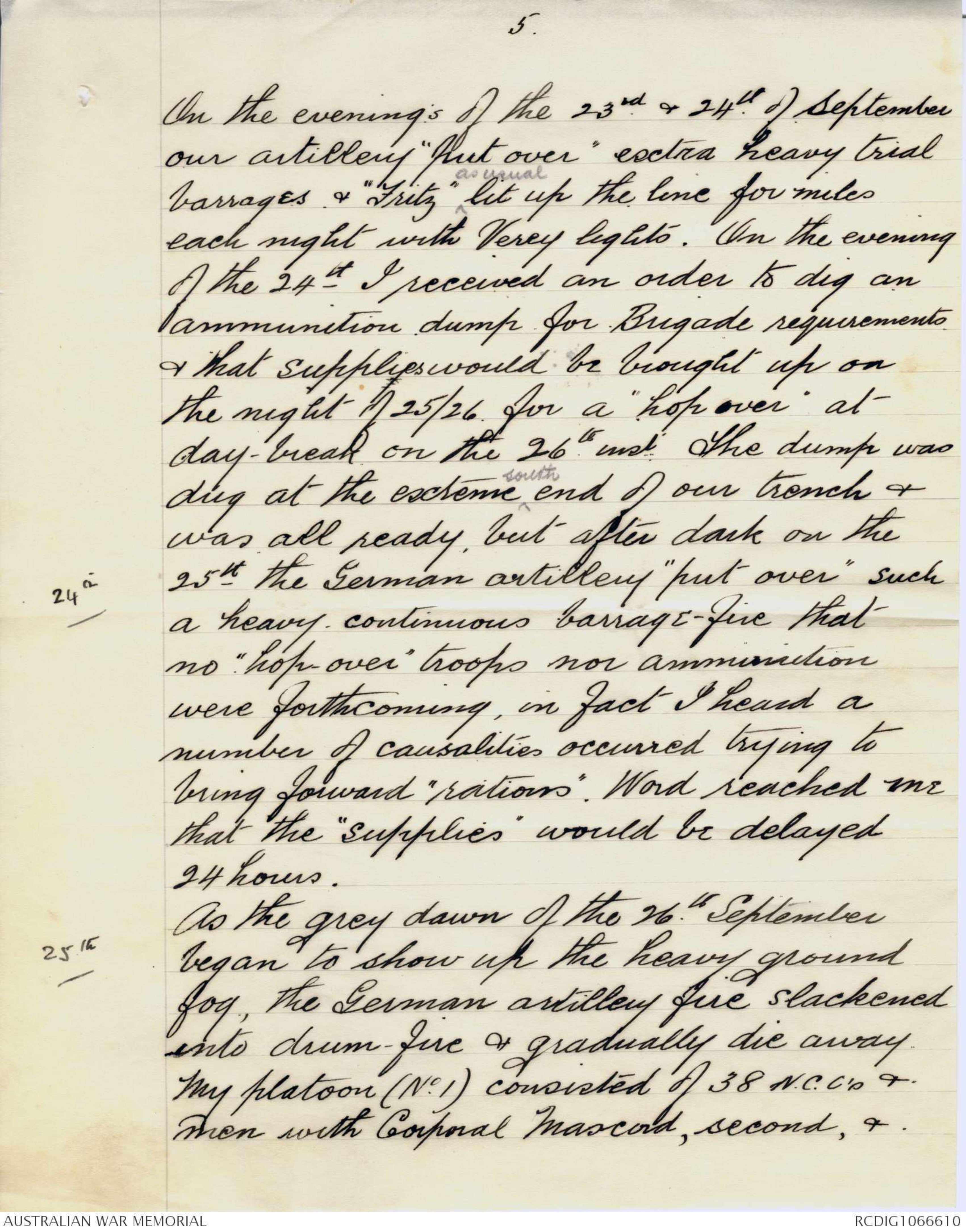
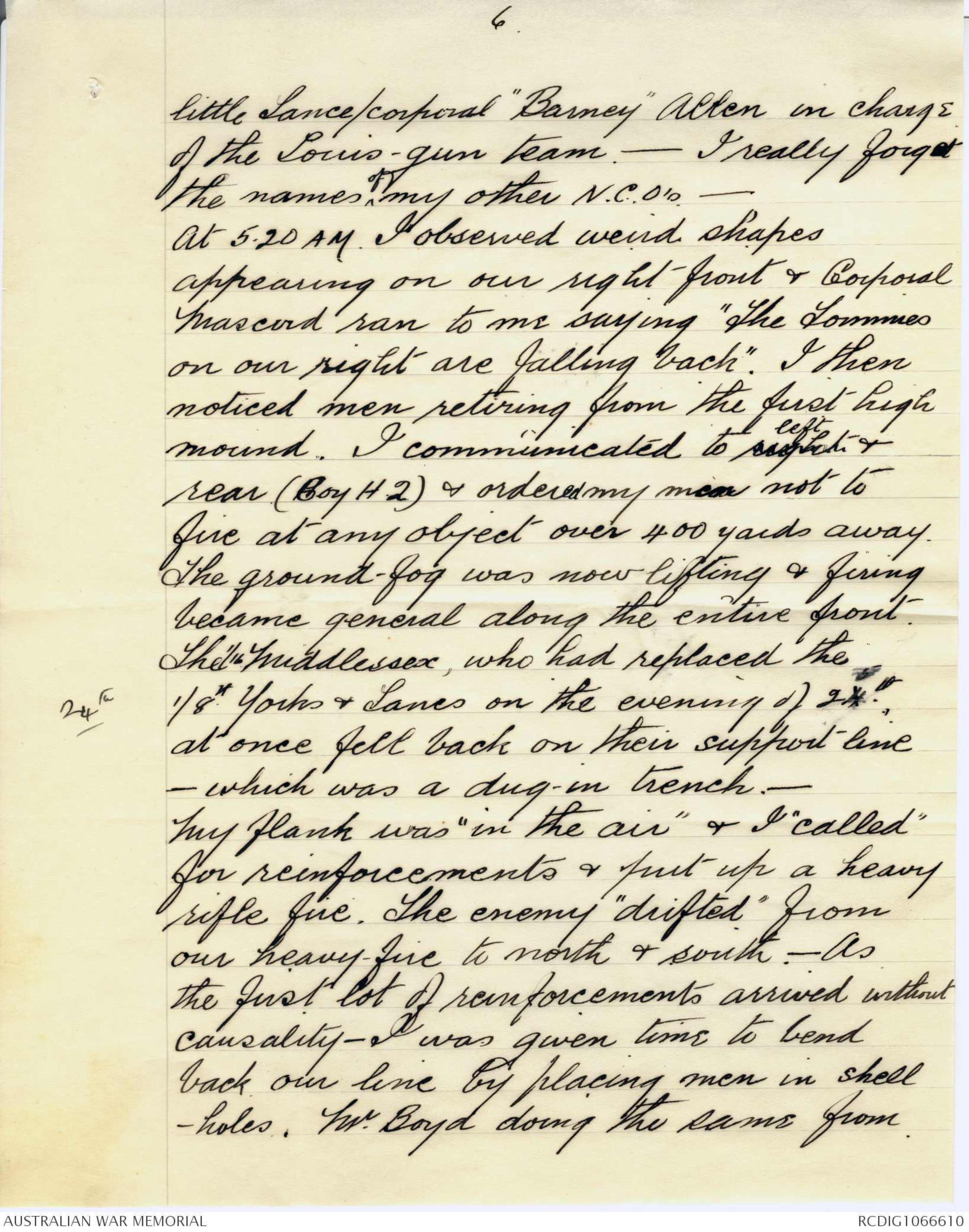
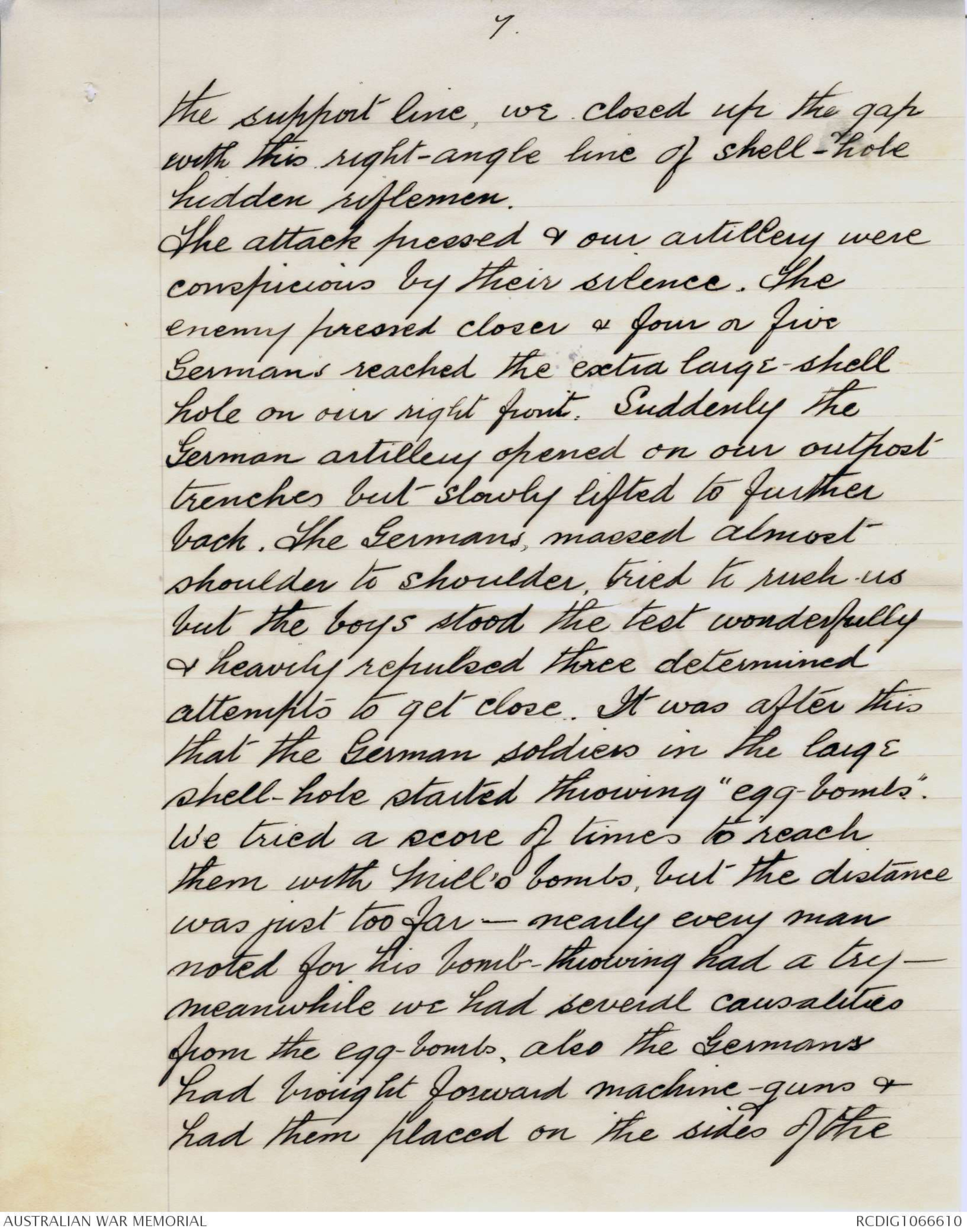
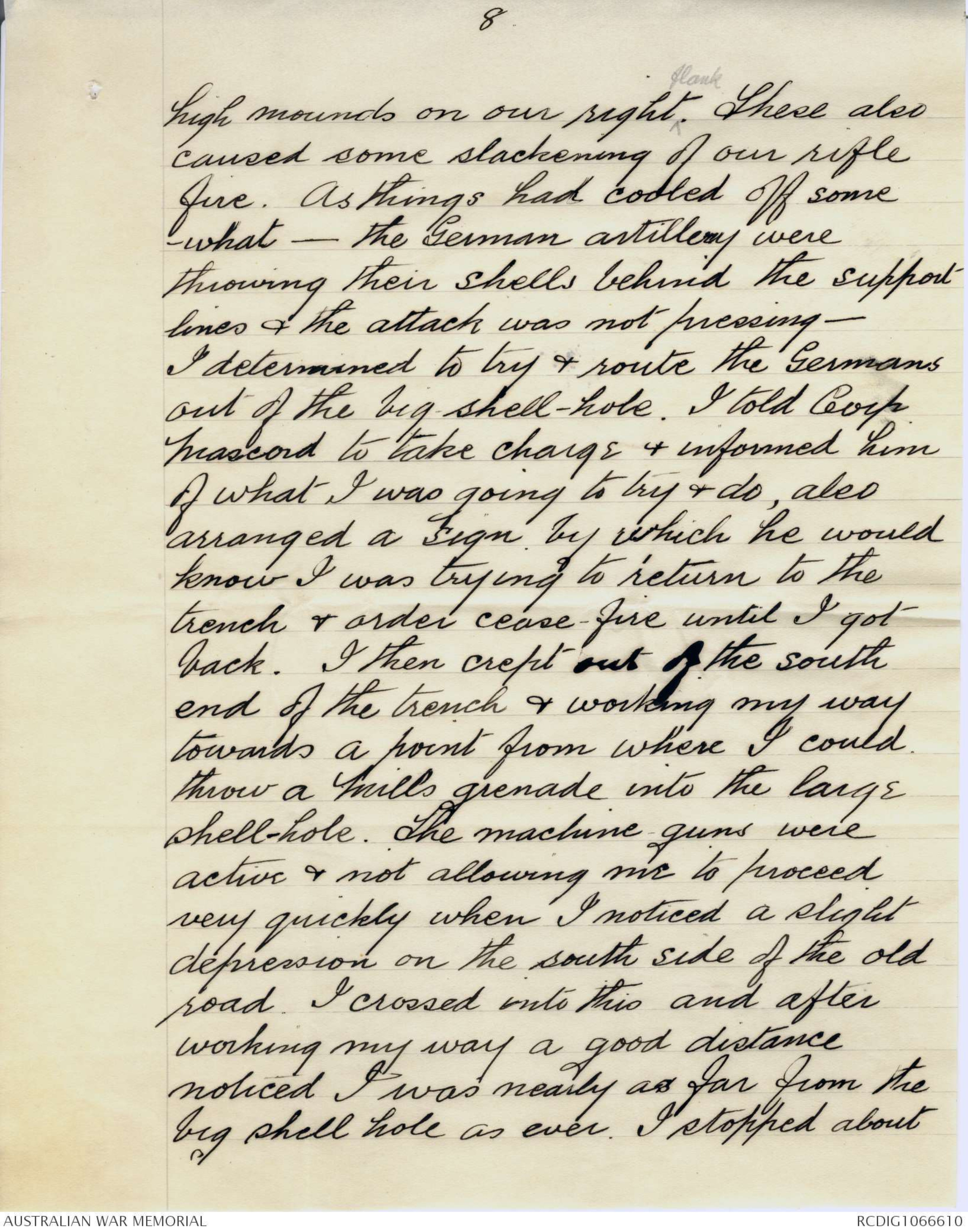
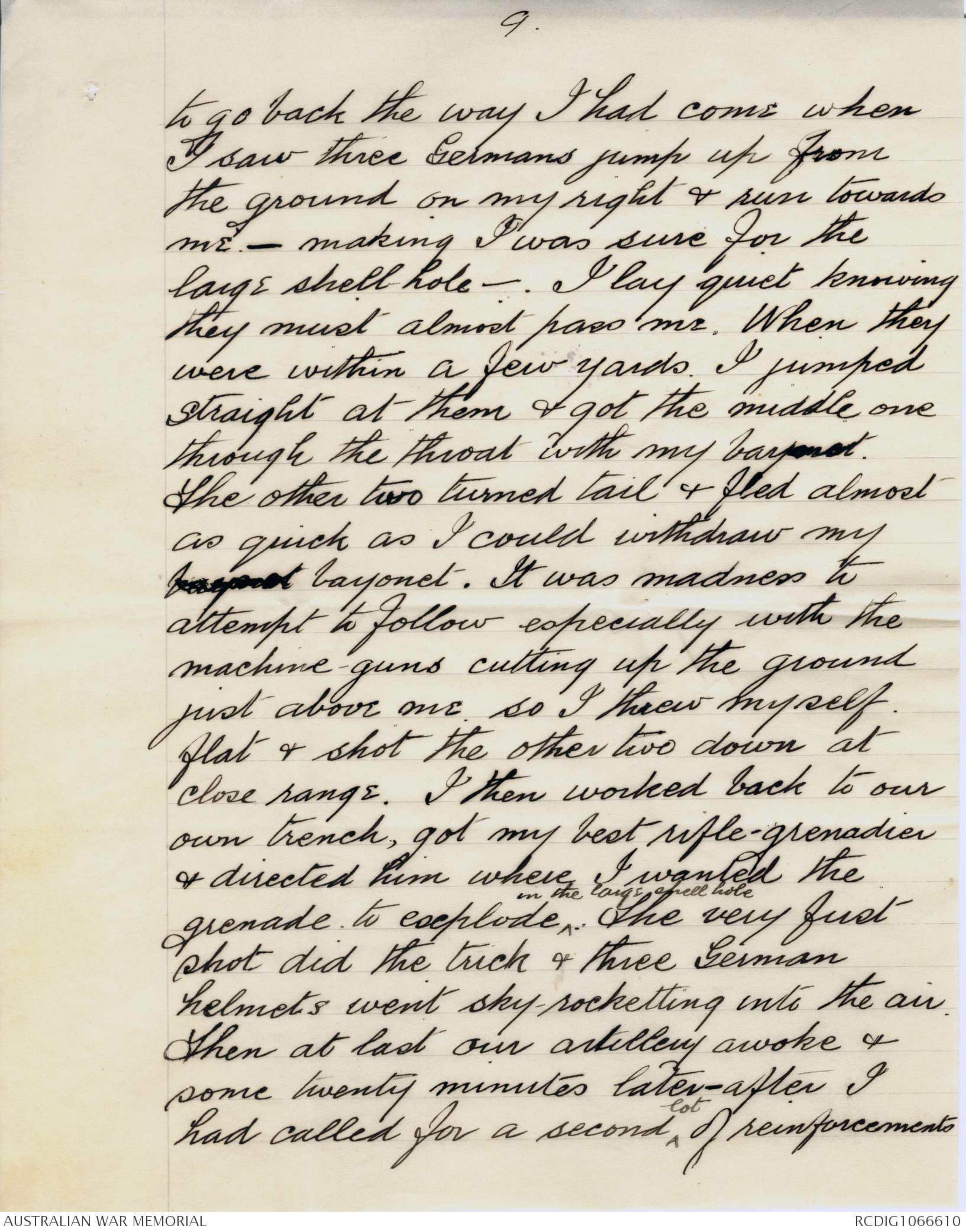
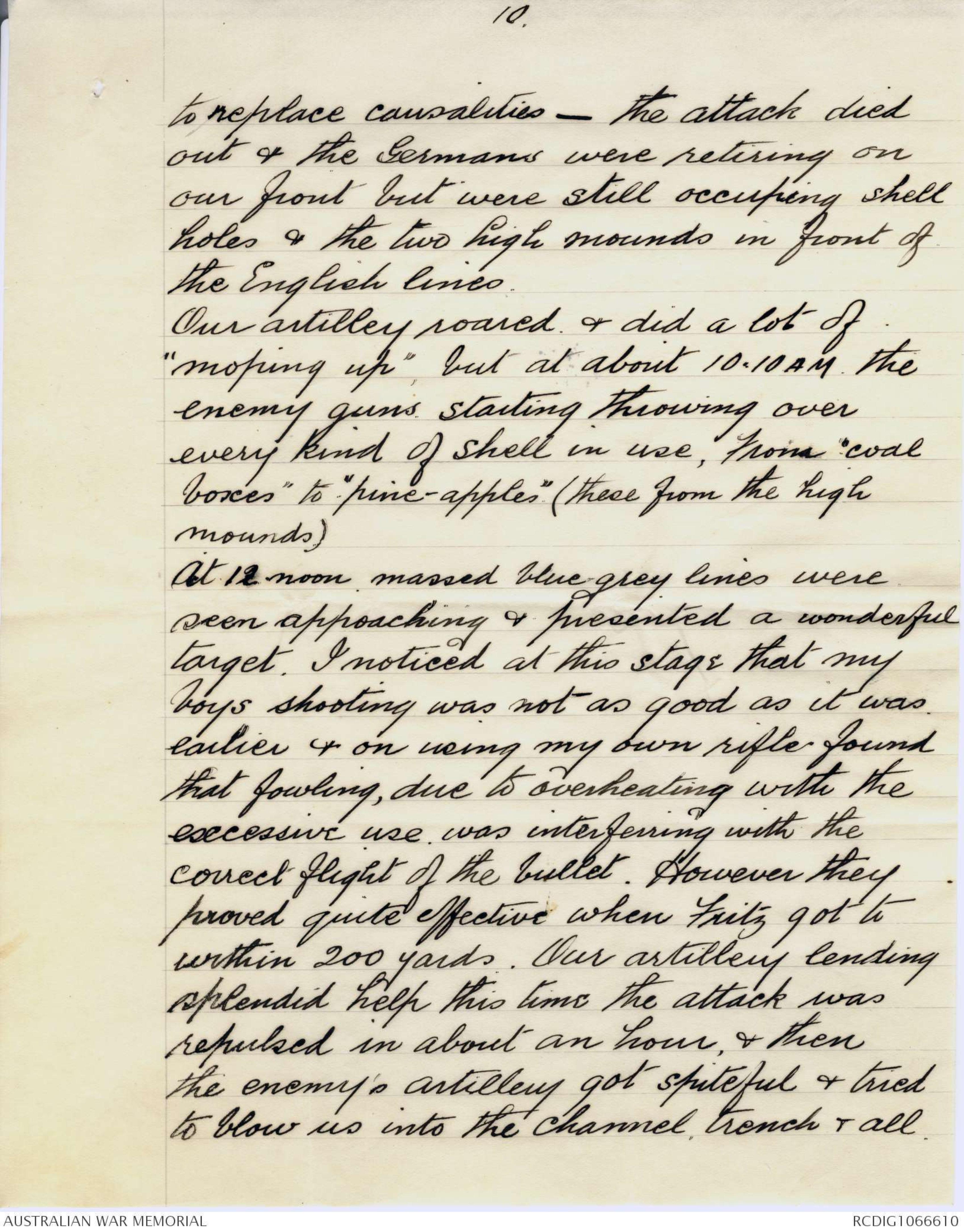
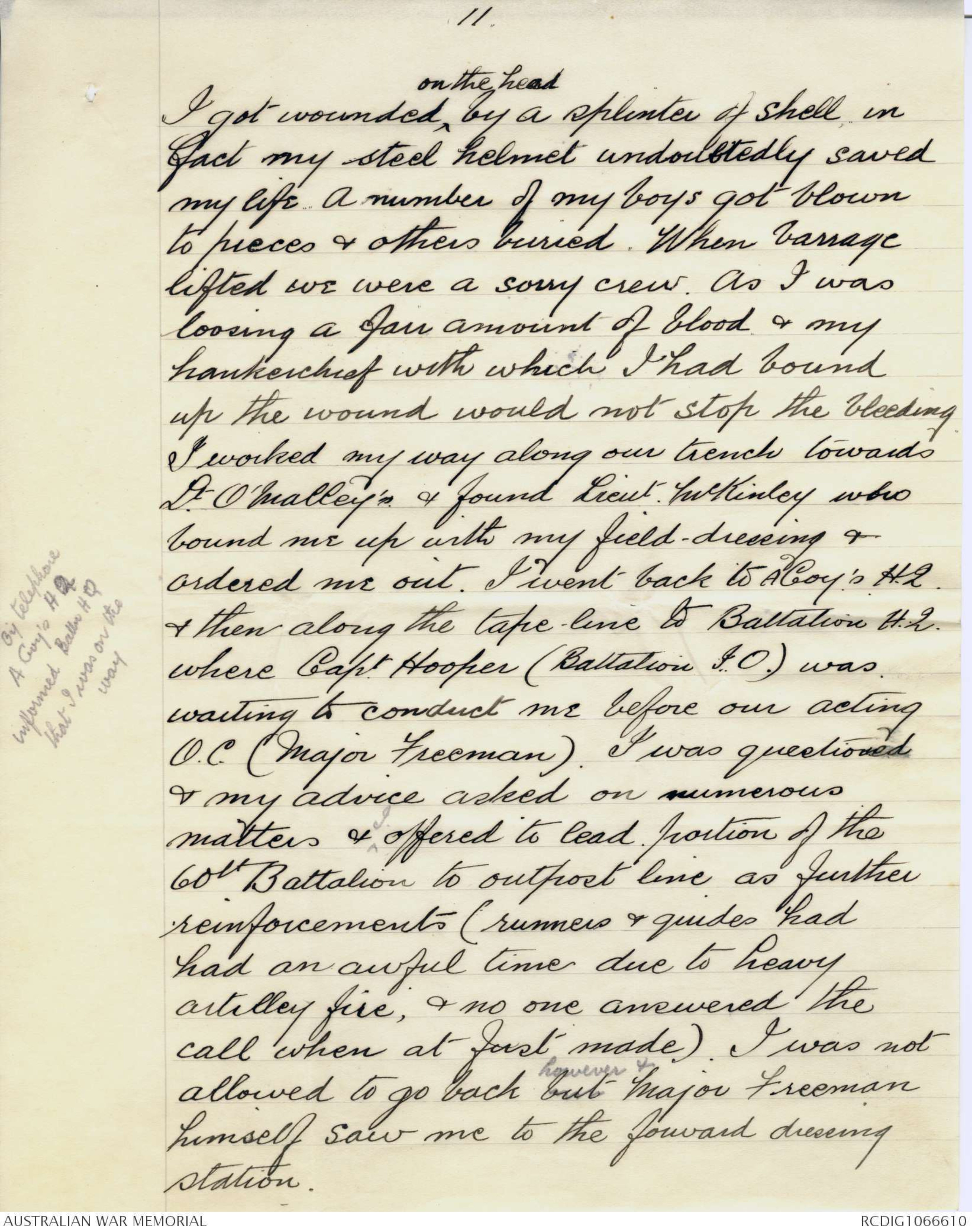
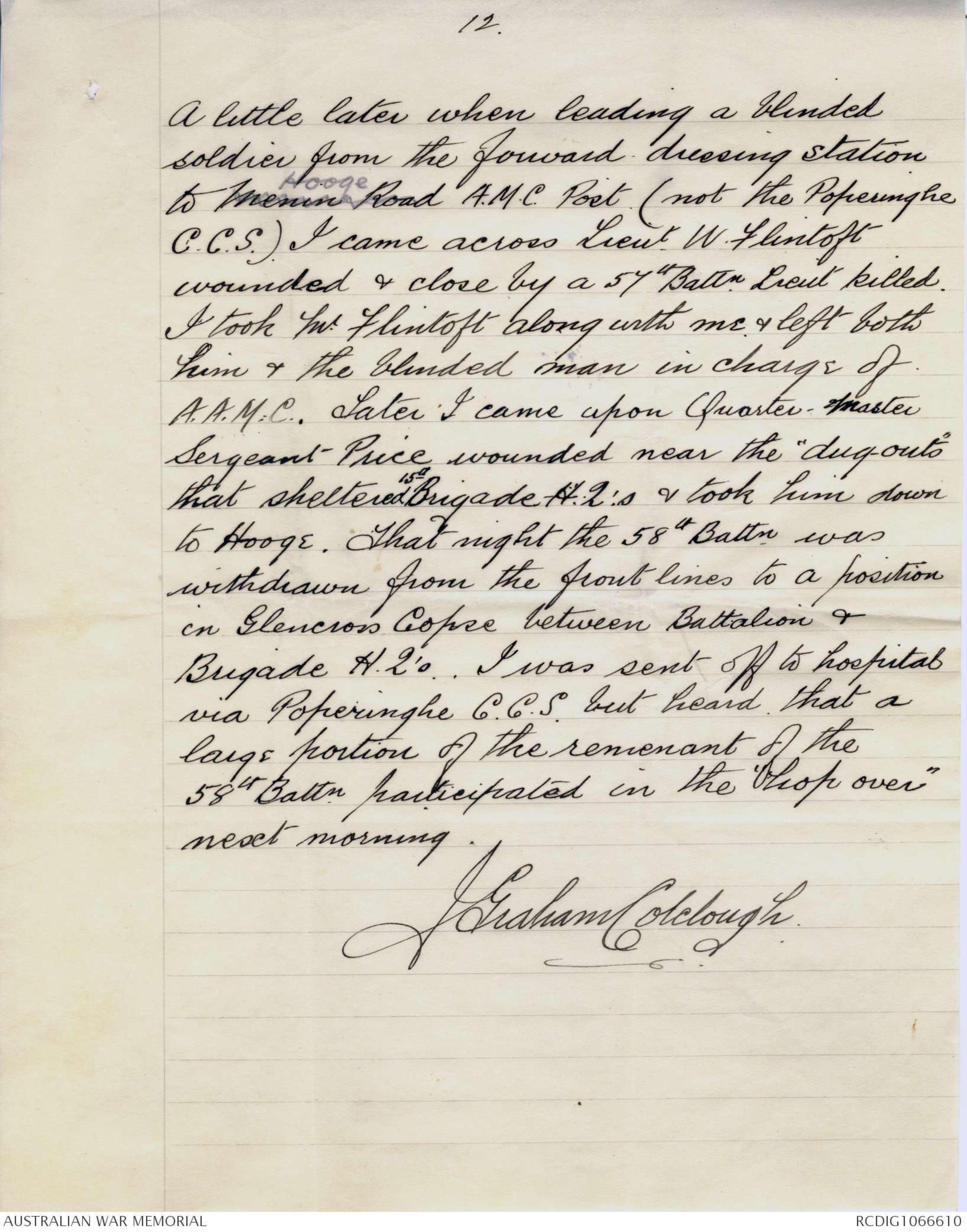
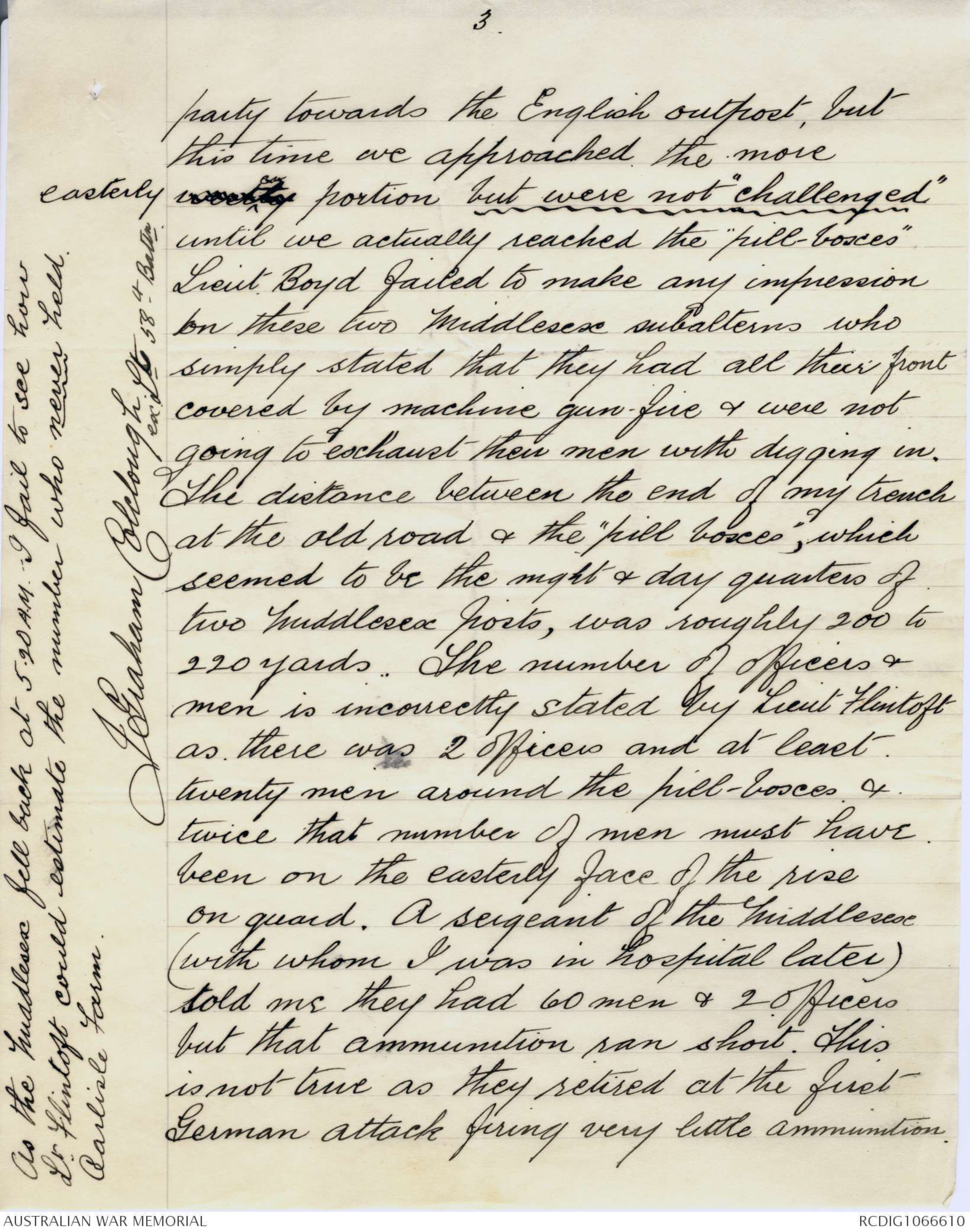
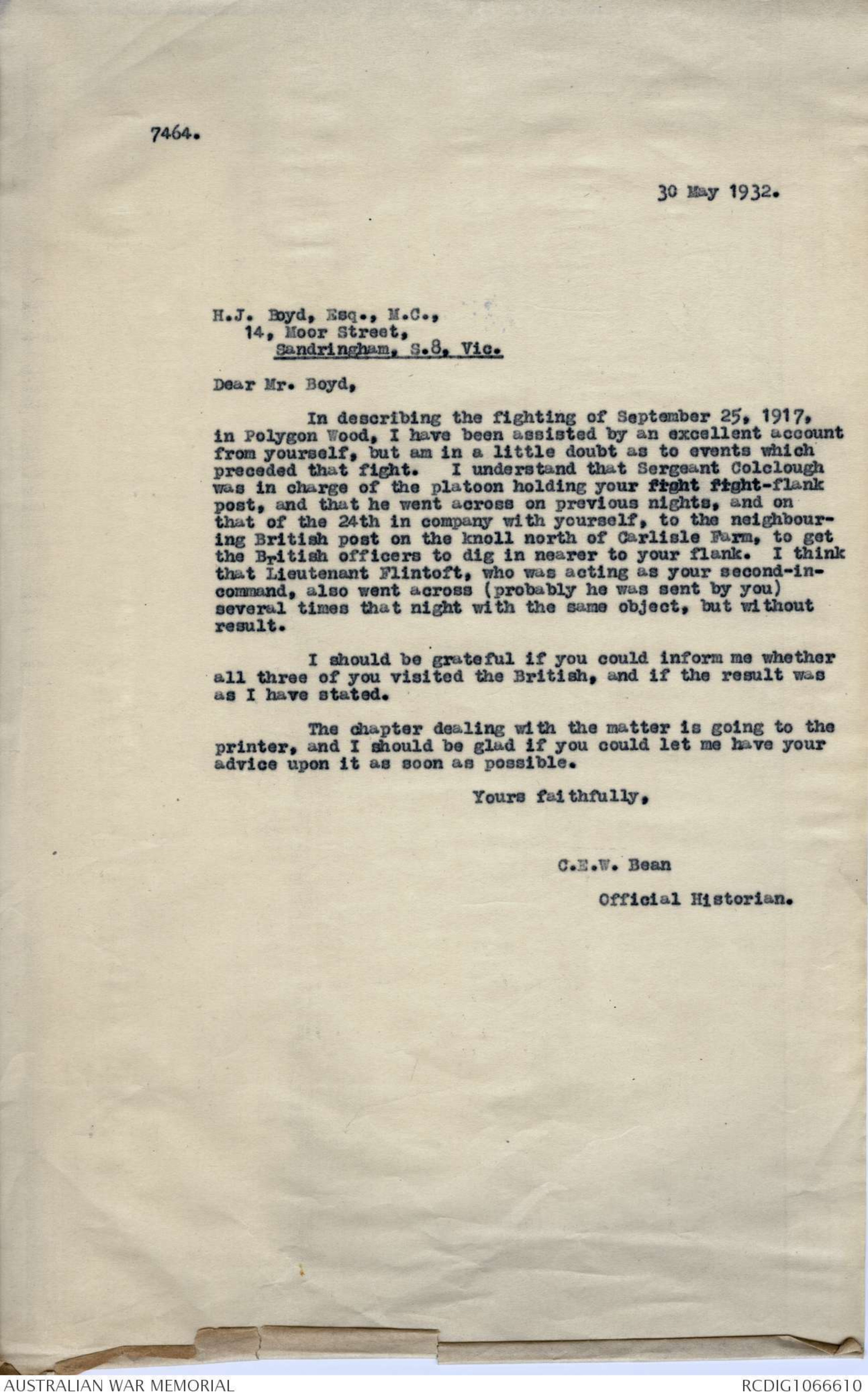
5.
On the evening's of the 23rd & 24th of September
our artillery "just over" extra heavy trial
barrages & "Fritz" ^as usual lit up the line for miles
each night with Verey lights. On the evening
of the 24th I received an order to dig an
ammunition dump for Brigade requirements
& that supplies would be brought up on
the night of 25/26 for a "hop over" at
day-break on the 26th inst. The dump was
dug at the extreme ^south end of our trench &
was all ready, but after dark on the
25th the German artillery "put over" such
[*24th*] a heavy continuous barrage-fire that
no "hop over" troops nor ammunition
were forthcoming, in fact I heard a
number of causalities occurred trying to
bring forward "rations". Word reached me
that the "supplies" would be delayed
24 hours.
As the grey dawn of the 26th September
[*25th*]began to show up the heavy ground
fog, the German artillery fire slackened
into drum-fire & gradually die away
my platoon (No.1) consisted of 38 N.C.O's &
men with Corporal Mascord, second &.
6
little Lance/corporal "Barney" Allen in charge
of the Louis-gun team. - I really forgot
the names ^of my other N.C.O's -
At 5.20 AM I observed weird shapes
appearing on our right front & Corporal
Mascord ran to me saying "The Tommies
on our right are falling back". I then
noticed men retiring from the first high
mound. I communicated to right left &
rear (Coy H 2) & ordered men not to
fire at any object over 400 yards away.
The ground-fog was now lifting & firing
became general along the entire front.
The 1/16 Middlesex, who had replaced the
[*24th*] 1/8th Yorks & Lancs on the evening of 24th
at once fell back on their support line
-which was a dug-in trench. -
my flank was "in the air" & I "called"
for reinforcements & put up a heavy
rifle fire. The enemy "drifted" from
our heavy-fire to north & south. - As
the first lot of reinforcements arrived without
causality - I was given time to bend
back our line by placing men in shell
-holes. [[?]]Boyd doing the same from
7
the support line, we closed up the gap
with this right-angle line of shell-hole
hidden riflemen.
The attack pressed & our artillery were
conspicious by their silence. The
enemy pressed closer & four or five
Germans reached the extra large shell
hole on our right front. Suddenly the
German artillery opened on our outpost
trenches but slowly lifted to further
back. The Germans massed almost
shoulder to shoulder, tried to rush us
but the boys stood the test wonderfully
& heavily repulsed three determined
attempts to get close. It was after this
that the German soldiers in the large
shell-hole started throwing "egg-bombs".
We tried a score of times to reach
them with Mill's bombs, but the distance
was just too far - nearly every man
noted for his bomb-throwing had a try -
meanwhile we had several causalities
form the egg-bombs, also the Germans
had brought forward machine-guns &
had them placed on the sides of the
8
high mounds on our right^flank. These also
caused some slackening of our rifle
fire. As things had cooled off some
-what - the German artillery were
throwing their shells behind the support
lines & the attack was not pressing -
I determined to try & route the Germans
out of the big shell-hole. I told Corp
Mascord to take charge & informed him
of what I was going to try & do, also
arranged a sign by which he would
know I was trying to return to the
trench & order cease-fire until I got
back. I then crept out of the south
end of the trench & working my way
towards a point from where I could
throw a mills grenade into the large
shell-hole. The machine guns were
active & not allowing me to proceed
very quickly when I noticed a slight
depression on the south side of the old
road. I crossed into this and after
working my way a good distance
noticed I was nearly as far from the
big shell hole as ever. I stopped about
9
to go back the way I had come when
I saw three Germans jump up from
the ground on my right & run towards
me - making I was sure for the
large shell hole - I lay quiet knowing
they must almost pass me. When they
were within a few yards I jumped
straight at them & got the middle one
through the throat with my bayonet.
The other two turned tail & fled almost
as quick as I could withdraw my
bayonet bayonet. It was madness to
attempt to follow especially with the
machine guns cutting up the ground
just above me so I threw myself
flat & shot the other two down at
close range. I then worked back to our
own trench, got my best rifle-grenadier
& directed him where I wanted the
grenade to explode ^ in the large shell hole. The very first
shot did the trick & three German
helmets went sky-rocketting into the air.
Then at last our artillery awoke &
some twenty minutes later - after I
had called for a second ^ lot of reinforcements
10.
to replace causalities - the attack died
out & the Germans were retiring on
our front but were still occupying shell
holes & the two high mounds in front of
the English lines.
Our artillery roared & did a lot of
"moping up" but at about 10.10AM the
enemy guns starting throwing over
every kind of shell in use, from "coal
boxes" to "pine-apples" (these from the high
mounds)
At 12 noon massed blue grey lines were
seen approaching & presented a wonderful
target. I noticed at this stage that my
boys shooting was not as good as it was
earlier & on using my own rifle found
that fouling, due to overheating with the
excessive use was interferring with the
correct flight of the bullet. However they
proved quite effective when Fritz got to
within 200 yards. Our artillery lending
splendid help this time the attack was
repulsed in about an hour & then
the enemy's artillery got spiteful & tried
to blow us into the channel trench & all.
11.
I got wounded ^on the head by a splinter of shell in
fact my steel helmet undoubtedly saved
my life. A number of my boys got blown
to pieces & others buried. When barrage
lifted we were a sorry crew. As I was
loosing a fair amount of blood & my
hankerchief with which I had bound
up the wound would not stop the bleeding
I worked my way along our trench towards
Dr. O'Malley's & found Lieut. McKinley who
bound me up with my field-dressing &
ordered me out. I went back to A Coy's H.Q.
& then along the tape-line to Battalion H.Q.
where Capt. Hooper (Battalion [I.O.) was
waiting to conduct me before our acting
O.C. (Major Freeman). I was questioned
& my advice asked on numerous
matters & offered to lead portion of the
60th Battalion to outpost line as further
reinforcements (runners & guides had
had an awful time due to heavy
artilley fire, & no one answered the
call when at first made). I was not
allowed to go back however and but Major Freeman
himself saw me to the forward dressing
station.
[[*by telephone
A Coy's HQ
informed Battn HQ
that I was on the
way*]]
12.
A little later when leading a blinded
soldier from the forward dressing station
to Menin Road Hooge A.M.C. Post (not the Poperinghe
C.C.S.) I came across Lieut. W. Flintoft
wounded & close by a 57th Battn Lieut killed.
I took W. Flintoft along with me & left both
him & the blinded man in charge of
A.A.M.C. Later I came upon Quarter-master
Sergeant Price wounded near the "dug-outs"
that sheltered 15th Brigade H.Q's & took him down
to Hooge. That night the 58th Battn was
withdrawn from the front lines to a position
in Glencross Copse between Battalion &
Brigade H.Q's. I was sent off to hospital
via Poperinghe C.C.S. but heard that a
large portion of the remenant of the
58th Battn participated in the "hop over"
next morning.
J Graham Colclough
3.
party towards the English outpost, but
this time we approached the more
easterly xxxx portion but were not "challenged"
until we actually reached the "pill-boxes"
Lieut Boyd failed to make any impression
on these two Middlesex subalterns who
simply stated that they had all their front
covered by machine gun-fire & were not
going to exhaust their men with digging in.
The distance between the end of my trench
at the old road & the "pill boxes", which
seemed to be the night & day quarters of
two Middlesex posts, was roughly 200 to
220 yards. The number of officers &
men is incorrectly stated by Lieut Flintoft
as there as 2 officers an at least
twenty men around the pill-boxes &
twice that number of men must have
been on the easterly face of the rise
on guard. A sergeant of the Middlesex
(with whom I was in hospital later)
told me they had 60 men & 2 officers
but that ammunition ran short. This
is not true as they retired at the first
German attack firing very little ammunition.
[[*As the Middlesex fell back at 5.20 A.M. - I fail to see how
Lt. Flintoft could estimate the number who never held
Carlisle Farm.
J Graham Colcough
Ex Sgt. 58th Battn.*]]
7464.
30 May 1932.
H.J. Boyd, Esq., M.C.,
14, Moor Street,
Sandringham, S.8. Vic.
Dear Mr Boyd,
In describing the fighting of September 25, 1917,
in Polygon Wood, I have been assisted by an excellent account
from yourself, but am in a little doubt as to events which
preceded that fight. I understand that Sergeant Colclough
was in charge of the platoon holding your fight right-flank
post, and that he went across on previous nights, and on
that of the 24th in company with yourself, to the neighbouring
British post on the knoll north of Carlisle Farm, to get
the British officers to dig in nearer to your flank. I think
that Lieutenant Flintoft, who was acting as your second-in-command,
also went across (probably he was sent by you)
several times that night with the same object, but without
result.
I should be grateful if you could inform me whether
all three of you visited the British, and if the result was
as I have stated.
The chapter dealing with the matter is going to the
printer, and I should be glad if you could let me have your
advice upon it as soon as possible.
Yours faithfully,
C.E.W. Bean
Official Historian.
 Kate Benn
Kate BennThis transcription item is now locked to you for editing. To release the lock either Save your changes or Cancel.
This lock will be automatically released after 60 minutes of inactivity.